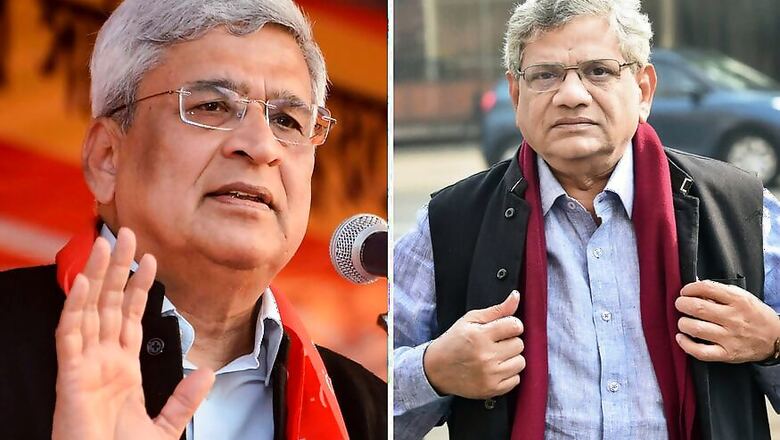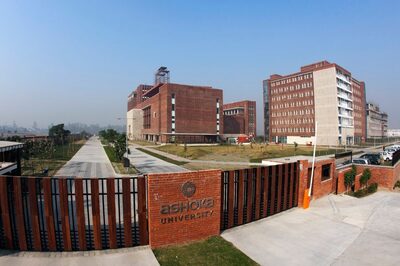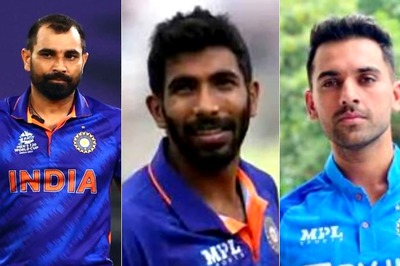OPINION | Secret Ballot, If Allowed, Could Help Sitaram Yechury One Up Prakash Karat at CPM Congress

views
For the first time in the 93 years of undivided Communist party history and the 54 years of CPM, demands were raised for a secret ballot on the party’s political-tactical line that will determine its future relationship with the Congress and is critical to the formation of a broad anti-BJP coalition ahead of 2019 Lok Sabha elections.
As of now, the party is divided between the lines of general secretary Sitaram Yechury calling for understanding between all Left-secular-democratic forces, including the Congress, to defeat the BJP and the stand taken by his predecessor Prakash Karat opposing any truck with the Congress.
With just two days left for the party to adopt the crucial political-tactical line and re-elect or elect a new general secretary at its ongoing Hyderabad party Congress, hectic and last-ditch lobbying is underway by both camps to canvass support for their respective resolutions.
The political-tactical line is adopted by a show of hands, but on Wednesday, some delegates demanded secret ballot.
On Thursday, representatives from 11 states spoke, of which six states underscored the different opinions, while Maharashtra delegates also demanded secret ballot.
In the Kolkata Central Committee meeting in January, the Karat faction defeated Yechury’s draft resolution by 31:55 vote. On Wednesday, the Central Committee adopted as many as 286 amendments to the majority resolution that will be discussed on Thursday and put to vote.
Organisational report will come up for discussion on Friday and voting is slated for Saturday.
The Central Committee that met on Tuesday allowed the general secretary to present the minority view before the 764 delegates, while Karat presented the majority draft resolution reaffirming his stand of no understanding with the Congress as he tried to delink electoral politics with political resolution.
Yechury camp argues that in the absence of electoral success, the party cannot grow and fight “fascistic” Sangh Parivar in collaboration with the secular Opposition.
Yechury supporters are expected to highlight the plus points (barring the controversial Indo-US nuclear deal) of the party’s association with the Congress between 2004 and 2008 that benefitted the aam aadmi.
UPA-I had passed a slew of right-based legislations and implemented several welfare measures; RTI, Right to Education, food security, right to fair compensation to farmers, MREGA to name a few, and was able to apply brakes on mindless disinvestment of PSUs.
Though the party constitution does not stipulate secret ballot, it does not rule it out either. Sources said a secret ballot could be advantageous to Yechury’s political line as some delegates may not be comfortable openly opposing the Karat doctrine backed by the powerful Kerala lobby. They said even if Yechury fails to muster support to his resolution, he could still be re-elected general secretary.
In 1998, Jyoti Basu and Harkishan Singh Surjeet felt that the CPM should join the then United Front government led by Deve Gowda, but their resolution to this effect was rejected by the Kolkata Congress and the same Congress re-elected Surjeet as general secretary.
Whether the Karat faction will field a candidate against Yechury remains to be seen. He has been egging former Tripura chief minister Manik Sarkar to contest against Yechury for the general secretary post. It is not yet clear whether that project has been abandoned or there will be some last minute surprise. A source from Kerala said Sarkar may not like the idea of challenging Yechury.
According to the laid down practice in the CPM, the party Congress is the only occasion that can even amend the constitution and between Congress to Congress, it is the Central Committee that takes all the decisions.
When the question had come up for secret ballot on political resolution at the Central Committee, a senior pro-Karat member tried to scuttle the move saying delegates can express their opinion on political-tactical line without fear or favour by show of hands.
The Kerala faction, it is learnt, was not comfortable with the Central Committee decision to allow Yechury to present his minority draft. There are complaints that the powerful Kerala faction has been trying to influence selection of delegates to stage managed the democratic process.
According to CPM watchers, such lobbying was never seen in the nearly 100 years of Left movement in India. Much will depend on the mood of delegates and their stand on secret ballot to espouse internal democracy in the party.
(The author is a senior journalist and political commentator. Views are personal.)

















Comments
0 comment